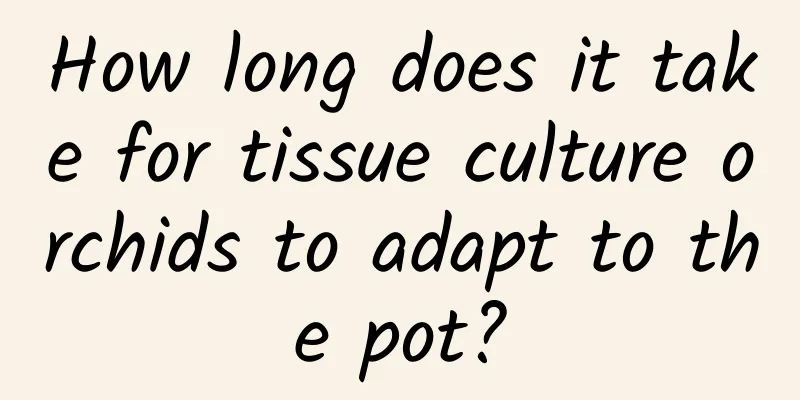How long does it take for tissue culture orchids to adapt to the pot?

Time for tissue culture orchids to adapt to pots If three months after the tissue culture orchid is potted, the growth momentum is still very good, and the leaves are becoming stronger and stronger, and the color is becoming brighter and brighter, then it means that the orchid has completely adapted to the pot. If there are buds when the tissue culture orchid is planted, leaves may grow soon. If there are no buds, new leaves may have to wait until autumn or spring of the following year. Depending on the maintenance and management conditions, it takes about 1-3 months for tissue culture orchids to grow new roots. If the maintenance is good, it will be faster. Performance of tissue culture orchids acclimatizing When the new buds of tissue-cultured orchids begin to unfold their leaves and the leaves become upright and strong, they are slowly taking root. Of course, when the leaves of the orchid have begun to photosynthesize to provide nutrients, they have already taken root and adapted to the pot. How to make cactus adapt to the pot quickly The old planting material contains microorganisms that are beneficial to the roots of tissue cultured orchids. Mixing the old planting material into the new planting material can make the new planting material quickly reproduce microorganisms that are beneficial to the orchid roots, allowing the orchid roots to adapt to the new environment faster. How to care for tissue culture orchids during the acclimatization period Tissue cultured orchid seedlings are afraid of two things: one is high temperature and humidity, and the other is poor ventilation, which causes the moisture in the potting soil to dissipate slowly. Therefore, the environment needs to be ventilated. Now the temperature is not high, so just pay attention to ventilation. After the weather gets cold, move them indoors for maintenance, keep the potting soil dry, and then spray the leaves with moisture to retain moisture. Watering: Tissue cultured orchids cannot be watered right after they are potted. You have to wait 2-3 days before you can start watering them, but the amount should not be too much. Fertilization: There is no fixed time limit for when to fertilize a newly potted orchid. It depends on its acclimatization. Fertilizer can be applied as soon as new crystal heads grow. Sunbathing: In principle, newly potted tissue-cultured orchids should be placed in diffuse light for about 20 days to allow their roots and leaves to recover, and then exposed to the sun after they have adapted to the pot. |
<<: When is the best time to plant lisianthus seeds?
>>: What is the best fertilizer for pomegranate trees?
Recommend
Can the pitcher plant be cut off? Will it die?
1. Can it be cut off? If the pitcher plant of you...
How to grow papaya begonia
1. Alkaline loam The loam suitable for it needs t...
Cultivation methods and precautions of red calla lily
1. Maintenance methods 1. Soil: When planting red...
How to grow Jade Butterfly so that it can bloom out of the pot?
Jade butterfly is a relatively common succulent p...
When is the best time to sow poppy?
Poppy sowing time Poppy is an annual herb that is...
How to make the leaves of Clivia grow evenly? What to do if the leaves are uneven
1. How to make the leaves of Clivia grow evenly R...
What are the methods and precautions for breeding small jasper?
How to cultivate Jasper Jade plant prefers to be ...
How many years does it take for pineapple to bear fruit?
Introduction to Pineapple Planting Pineapples are...
How to grow potted green radish more vigorously
Pothos can be grown in pots or in water. Potted P...
How to raise the lotus
How to care for the lotus illumination When growi...
Cutting method of purple seal
Cutting time The best time is now in spring, befo...
Why does the azalea not bloom?
1. Reduce the amount of fertilizer 1. Reason: For...
Highland barley planting conditions, climate and geographical location requirements
Introduction to Highland Barley Highland barley c...
What does violet mean?
1. Purple Usually the purple color represents ete...
Which month is the best to sow water spinach?
Water spinach is popular for its crisp taste. As ...









